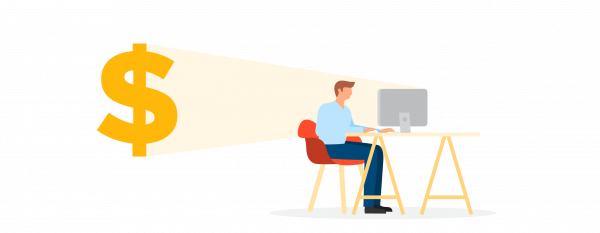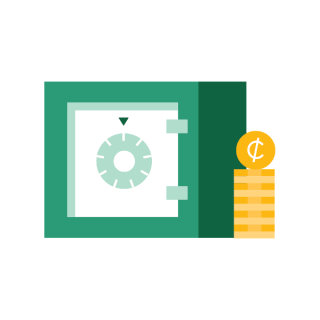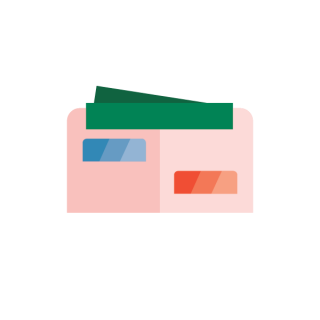Many or all of the products featured here are from our partners who compensate us. This influences which products we write about and where and how the product appears on a page. However, this does not influence our evaluations. Our opinions are our own. Here is a list of our partners and here's how we make money.
What is money management, exactly? It’s a plan for your money so you can make the most of it. This plan typically involves budgeting and saving money, avoiding or reducing debt and investing in your future.
If learning how to manage your money sounds intimidating or stressful, take it one step at a time. Below are money management tips to help you gain control and, more importantly, peace of mind.

Get a custom financial plan and unlimited access to a Certified Financial Planner™
NerdWallet Advisory LLC
How to manage your money
1. Take inventory of your finances 2. Build a money management blueprint 3. Make the most of your savings 4. Be persistent
1. Take inventory of your finances
Money management is about more than making the math work out. It’s about adjusting your mindset, too.
Take a mental inventory of your current position.
Are you consistently overspending?
Do you have enough saved up to survive an unexpected expense?
Do you live paycheck to paycheck?
Do you feel overwhelmed by financial jargon?
Be honest with yourself about where your weaknesses lie. You might’ve made some missteps in the past, but you don’t have to continue on that path. Here’s how to manage your money now, while preparing for the future.
2. Build a money management blueprint

Use the steps below to build a blueprint that works for your finances.
Start with a budget
If you’re not sure how to budget, start by choosing a system that you’ll stick with. We like the 50/30/20 budget plan, which allocates 50% of your income for needs, 30% for wants and 20% for savings and debt repayment. This 50/30/20 budget calculator divides your income into these categories.
If the 50/30/20 rules don’t work for you, there are plenty of other types of budgets to choose from. You may also find that a free budget app helps you stay on top of your finances.
Track your spending
By tracking expenses, you can see exactly where your money is going. It may inspire you to stop spending so much in a certain category or adjust your spending habits so they better align with your goals.
Find ways to save
As you pay more attention to your finances, you’ll likely find opportunities to save. Here’s how to save money, from tweaking daily habits, to negotiating bills, to making long-term changes.
Ideally, over time, saving money will become part of your lifestyle. If you want to learn more about saving money with coupons, freebies and DIY hacks, check out our guide to frugal living.

Use designated accounts for spending and savings
One way to make money management easier is to keep money designated for bills and budgeted expenses separate from your emergency fund. This will reduce the temptation to dip into it for nonemergencies. Saving for a house, vacation or new car? Stash those funds in separate accounts so you can see progress toward each goal.
Make a plan to pay off debt
A strategic approach to debt repayment will help you reach the debt-free finish line faster. We recommend tackling your most expensive debt — the accounts with the highest interest rates — first, while making minimum payments on the rest. Then, work your way down through any lower-interest rate debt until it is all paid off. Consider using windfalls, such as a tax refund or bonus at work, to make a dent in balances.
» Here are tools and tips to help you pay off debt
Develop good credit habits
Your credit can determine whether you’re able to get loans and the rates you pay on them, as well as many other aspects of your financial life. A credit check may be part of getting a cell phone plan, apartment or car insurance.
To stay on top of your score, focus on the two biggest factors that influence it: payment history and credit utilization (how much of your credit limits you’re using). Aim to pay everything on time, because just one missed payment can hurt your score, and use less than 30% of your credit limits on each card and overall.
» Learn what a good credit score is and how to get one
Invest in your financial future
Set money aside now, in a 401(k) or IRA, and let compound interest work its magic. The ultimate goal is long-term financial freedom and stability. Not sure how much you need to save? Try our retirement calculator.
3. Make the most of your savings
Money management goes beyond spending less than you make. A true sign of financial prowess is saving enough to live comfortably in the long term as well as the short term.
You can achieve this in four steps:

Save
Start socking away extra money to build an emergency fund. Ideally, you should have six months’ worth of living expenses at your disposal in case the unthinkable happens. If that seems too ambitious, start small. A $500 reserve is a great first goal.

Invest
Invest extra money for your future. Set yourself up for retirement by contributing to a 401(k). If your company offers a match, contribute enough to get the maximum.

Pay off debt
Whether it’s a loan or a looming credit card bill, you probably have some debt obligations. Always make at least the minimum monthly payments so you don’t suffer credit score damage due to a late payment. If you have extra money for bills, pay down the high-interest debt first.

Repeat
Keep building up that emergency fund, investing for retirement and knocking down debt.
4. Be persistent
Despite their good intentions, many people fall off the financial bandwagon. Sticking to a budget that’s too restrictive can be suffocating. Navigating investment jargon can be confusing. But don’t get discouraged.
You didn’t get in the financial position you’re in overnight, and you won’t get out of it overnight, either. Give yourself time to learn and grow. With hard work and dedication, you can manage your money with confidence.


on Capitalize's website



